代码:
import tensorflow as tf
from tensorflow.examples.tutorials.mnist import input_data
#载入数据集
#当前路径
mnist = input_data.read_data_sets("MNISt_data", one_hot=True)运行结果:
Extracting MNISt_data/train-images-idx3-ubyte.gz
Extracting MNISt_data/train-labels-idx1-ubyte.gz
Extracting MNISt_data/t10k-images-idx3-ubyte.gz
Extracting MNISt_data/t10k-labels-idx1-ubyte.gz代码:
#每个批次的大小
#以矩阵的形式放进去
batch_size = 100
#计算一共有多少个批次
n_batch = mnist.train.num_examples // batch_size
#参数概要
def variable_summaries(var):
with tf.name_scope('summaries'):
mean = tf.reduce_mean(var)
#记录一个值并给出名字
tf.summary.scalar('mean', mean)#平均值
with tf.name_scope('stddev'):
stddev = tf.sqrt(tf.reduce_mean(tf.square(var - mean)))
tf.summary.scalar('stddev', stddev)#标准差
tf.summary.scalar('max', tf.reduce_max(var))#最大值
tf.summary.scalar('min', tf.reduce_min(var))#最小值
tf.summary.histogram('histogram', var)#直方图
#命名空间
with tf.name_scope('input'):
#定义两个placeholder
#28 x 28 = 784
x = tf.placeholder(tf.float32, [None, 784], name='x_input')
y = tf.placeholder(tf.float32, [None, 10], name='y_input')
with tf.name_scope('layer'):
#创建一个简单的神经网络
#输入层784,没有隐藏层,输出层10个神经元
with tf.name_scope('weights'):
W = tf.Variable(tf.zeros([784, 10]), name='W')
variable_summaries(W)
with tf.name_scope('biases'):
b = tf.Variable(tf.zeros([1, 10]), name='b')
variable_summaries(b)
with tf.name_scope('wx_plus_b'):
wx_plus_b = tf.matmul(x, W) + b
with tf.name_scope('softmax'):
prediction = tf.nn.softmax(wx_plus_b)
with tf.name_scope('loss'):
#二次代价函数
loss = tf.reduce_mean(tf.square(y - prediction))
#只有一个值没必要调用函数
tf.summary.scalar('loss', loss)
#交叉熵
#loss = tf.reduce_mean(tf.nn.softmax_cross_entropy_with_logits(labels=y, logits=prediction))
with tf.name_scope('train'):
#使用梯度下降法
train_step = tf.train.GradientDescentOptimizer(0.2).minimize(loss)
#初始化变量
init = tf.global_variables_initializer()
with tf.name_scope('accuracy'):
with tf.name_scope('correct_prediction'):
#结果存放在一个布尔型列表中
#tf.argmax(y, 1)与tf.argmax(prediction, 1)相同返回True,不同则返回False
#argmax返回一维张量中最大的值所在的位置
correct_prediction = tf.equal(tf.argmax(y, 1), tf.argmax(prediction, 1))
with tf.name_scope('accuracy'):
#求准确率
#tf.cast(correct_prediction, tf.float32) 将布尔型转换为浮点型
accuracy = tf.reduce_mean(tf.cast(correct_prediction, tf.float32))
tf.summary.scalar('accuracy', accuracy)
#合并所有的summary
merged = tf.summary.merge_all()
with tf.Session() as sess:
sess.run(init)
#当前路径logs文件夹
writer = tf.summary.FileWriter('logs/', sess.graph)
#总共51个周期
for epoch in range(51):
#总共n_batch个批次
for batch in range(n_batch):
#获得一个批次
batch_xs, batch_ys = mnist.train.next_batch(batch_size)
summary,_ = sess.run([merged, train_step], feed_dict={x:batch_xs, y:batch_ys})
writer.add_summary(summary, epoch)
#训练完一个周期后准确率
acc = sess.run(accuracy, feed_dict={x:mnist.test.images, y:mnist.test.labels})
print("Iter" + str(epoch) + ", Testing Accuracy" + str(acc))在命令行:
tensorboard --logdir=logs效果展示:
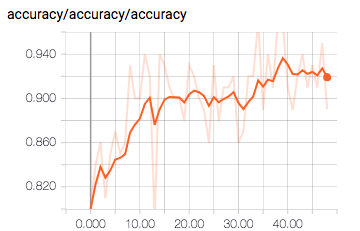
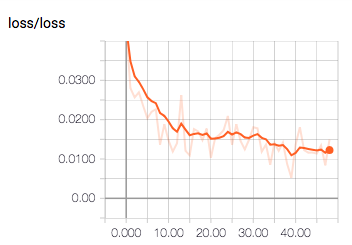
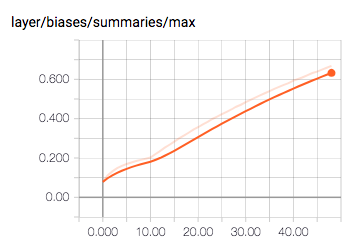
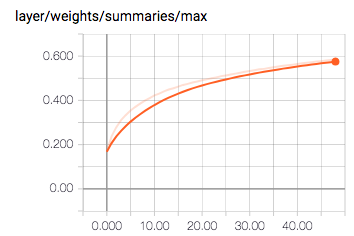
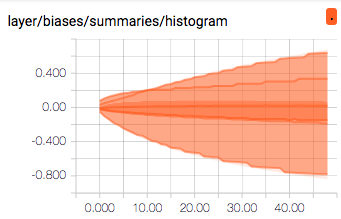
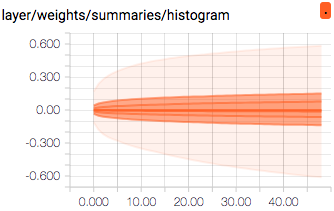
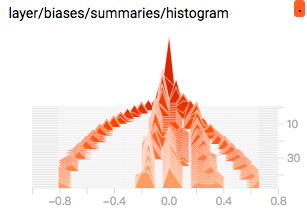
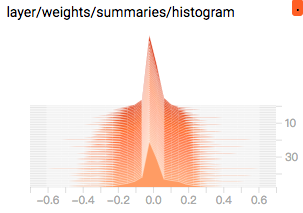




 本文介绍了一个基于TensorFlow的手写数字识别模型实现过程。利用MNIST数据集进行训练,并通过构建简单的神经网络来实现对手写数字的有效识别。文中详细展示了如何搭建模型、设置参数、训练及评估模型。
本文介绍了一个基于TensorFlow的手写数字识别模型实现过程。利用MNIST数据集进行训练,并通过构建简单的神经网络来实现对手写数字的有效识别。文中详细展示了如何搭建模型、设置参数、训练及评估模型。
















 497
497

 被折叠的 条评论
为什么被折叠?
被折叠的 条评论
为什么被折叠?








